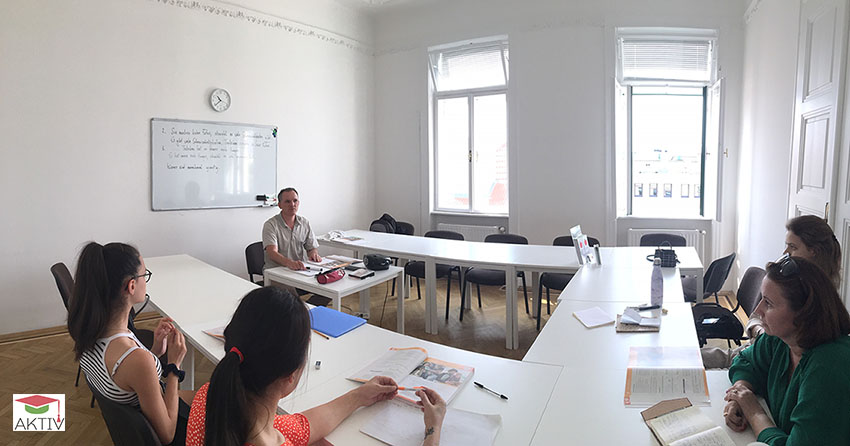Comparison of adjectives – German Grammar rules
German has surprises in store. Such as when we want to increase adjectives. How do we do that when we compare two things? Your German grammar journey starts here…
There are three levels of enhancement: the positive form, the comparative form and the superlative form. When do we use which word form when we increase an adjective? If we compare Anne with Susi, for example we say: “Anne läuft schneller als Susi. Maria läuft am Schnellsten.” That’s the increase in adjectives. We explain what matters.
The positive form – the basic form of adjectives
This is the form in which the adjective is compared, e.g. with “fast so … wie, doppelt so … wie, genauso … wie, nicht so … wie, halb so … wie”, etc. Here one uses comparisons consisting of a basic form of an adjective and “wie”.
Here are some examples:
„Kommunikation ist fast so wichtig wie das, was Sie sagen.
Mein kleiner Bruder ist nun fast so groß wie unser Vater.
Diese Bildkopie ist fast so schön wie das Original.
Die Altstadt von Wien ist fast so schön wie Venedig.
Markenjeans sind mindestens doppelt so teuer wie gewöhnliche.
Wer schlecht in der Schule ist muss sich doppelt so viel anstrengen wie jemand, der gute Noten hat.
Nicht zu grüßen ist nicht höflich. Das mag ich genauso wenig wie meine Freundin.
Freundschaft ist genauso wichtig wie Familie.
Sie wissen es genauso gut wie wir!
Ein Samsung ist nicht so gut wie ein Iphone. Stimmen Sie zu?
Ein Besen macht nicht so gut sauber wie ein Staubsauger.
Jovica ist nicht so gut in Mathematik wie Yara.
Yara ist halb so technisch begabt wie Jovica.
Anne läuft halb so schnell wie Susi“.
The comparative – the first form of adjective enhancement
In the comparative form the adjective is increased in the first form. We form the increase with “als” and add “-er” to the adjective at the end. Do not use “mehr” for this purpose.
Examples of this are:
„Anne läuft schneller als Susi“.
„Eine Komödie ist lustiger als ein Krimi“.
„Das Brot vom Bäcker ist frischer als das Brot vom Supermarkt“.
„Beim Discounter ist das Essen billiger als im kleinen Geschäft um die Ecke“.
If the positive basic form of the adjective is a monosyllabic with a, o or u, the ascending form is provided with a so called “Umlaut”.
Examples of this are:
Old – older: „Du bist 55 und ich bin 47. Du bist älter als ich“.
Long – longer: „Von Wien aus ist der Weg nach Rumänien länger als nach Ungarn“.
Tall – taller: „Ein Whiteboardstift ist größer als ein Kugelschreiber“.
Coarse – coarser: „Meersalz für die Badewanne ist gröber als Speisesalz“.
Short – shorter: „Nehmen wir doch diese Route! Der Weg durch die Autobahn ist kürzer als durch die Berge“!
Healthy – healthy: „Es heißt, Gemüse aus dem Bauernhof sei gesünder als Industriegemüse“.
The superlative – the highest form of increase of adjectives
The superlative form as the highest form of increase describes the maxim and is formed with “am”. You can also use the specific article. If “”am”” is used, the adjective is followed by an ending “-sten”.
Examples are:
Fast – the fastest: „Anne ist die schnellste Läuferin. Anne läuft am schnellsten“.
Lovely – the loveliest: „Diese Kekse esse ich am liebsten“.
Keen – the keenest: „In seiner Klasse ist Max der Fleißigste von allen Schülern. Er ist am Fleißigsten“.
Slowly – the slowliest: „Bei einem Tierwettrennen war Tortuga die Schildkröte die langsamste. Sie war am langsamsten”.
However, there are exceptions and peculiarities here as well, if you increase adjectives to the highest form. Here is an overview:
– Monosyllabic adjectives with a, o or u in the vowel often form an “Umlaut”, also in the superlative. For example, someone is “jung – jünger – am jüngsten“.
– In cases where adjectives end in “d/t” or “s/ß/x/z”, the superlative form is usually formed with “-est” at the end. For example, the weather is “heiß – heißer – am heißesten“.
Special features of adjective enhancement
Adjectives also have some peculiarities, which are based on the comparative as well as the superlative form:
– With an unstressed ending on “-er””-el” or “-bel”, the “e” in the comparative form is omitted. This is not the case in the superlative form. For example, someone is “edel – edler – am edelsten”, or the bracelet made of gold is “teuer – teurer – am teuersten”.
However, it does not apply to an ending on “-ell” and also not to adjectives whose ending on “-el” is emphasized. A painted vase is “originell – origineller – am originellsten“.
In the German course you will soon notice the many irregularities that the German language has to offer. A special feature is an irregularly increased adjective.
These adjectives are always increased irregularly
good – better – best: „Miranda kann gut singen. Anneliese kann besser singen als Miranda, aber Julia kann es immer noch am besten und ist deshalb im Chor“.
much – more – most of all: „Ich kann ja viel essen, wenn ich Hunger habe. Meine Schwester kann mehr essen als ich, und mein großer Bruder am meisten“.
near – near – next: „Dieser Bamkomat ist zu weit weg, fast 1 Km entfernt. Kennst du einen Bankomaten, der näher von uns ist? Um die Ecke 50 mn von hier ist der nächste. Er ist am nächsten von uns”.
high – higher – highest: „Mein Hund klettert sehr hoch, deiner kann höher springen als meiner, aber am höchsten kann es der Border Collie von Barbara“.
„gern – lieber – am liebsten“: „Anne ist gern Hühnerschnitzel, während Pauli am liebsten Pizza mag“.
In addition, there are special features in attributive adjectives. Adjectives that are attributive must be able to be declined in all forms of increase. First, the ending of the gradient form is appended. First we append the ending of the gradient form and then the ending of the declination. The superlative form always forms an attributive adjective with the particular article.
An example:
„Ich rufe meine kleine Schwester – meine kleinere Schwester – meine kleinste Schwester“.
Special features of an adverbial/predicative adjective
Adverbial adjectives always form the superlative form with “am” on the adjective we append the ending -sten.
An example: „wichtig – wichtiger – am wichtigsten“
The predicative adjective is not only superlatively formed with “am”, but also contains a certain article. If this is used, the ending – ste follows.
An example: „Diese Übung ist am wichtigsten“.
You can learn adjective increases in our German course by means of numerous exercises.














